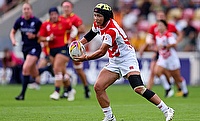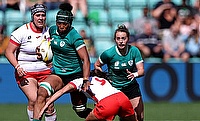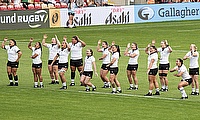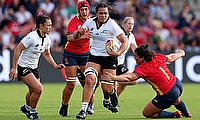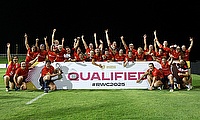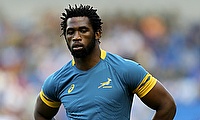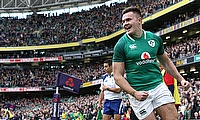Tier 2 Nations Assessed: Georgia (again) show their quality, fearless Portugal and notable wins for Spain and Romania
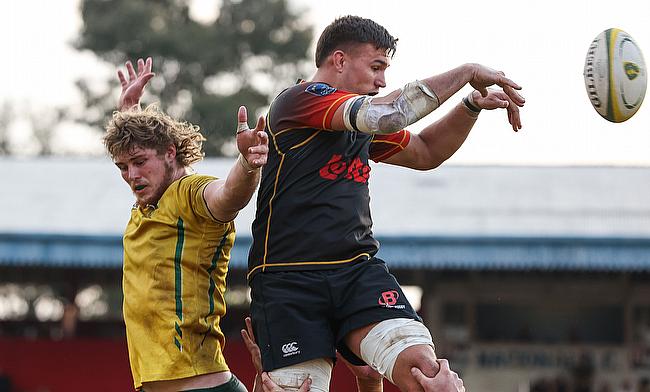
Belgium were in action in South America against Chile, Paraguay and Brazil
©Fotojump / Brasil Rugby
With July and the mid-year international window drawing to a close, it’s time to review how the European Tier 2 nations fared.
Who overperformed? And what are the main takeaways?
Let us answer all your questions and shed some light on how Portugal, Spain, Georgia, Romania, Germany and Belgium all got on.
Georgia – Cockerill narrows margins to the top 10
Grade: B
Top debutant: Luka Goginava (Loosehead prop)
Player of the Tour: Luka Matkava (Fly-half)
Tour: Fiji (12-21), Japan (25-23) and Australia (29-40)
After retaining the Men’s Rugby Europe Championship in March, the Lelos scheduled a tight and intense summer fixture list with Fiji, Japan and Australia on the Test Match menu.
After four weeks, the Georgians finished with one win and two losses but narrowed the gap to the Wallabies and defeated Japan on Brave Blossoms soil.
With Beka Gorgadze as the new captain for the foreseeable future, the Georgian pack excelled in the scrum and added much-needed momentum against Japan, which ultimately swung the game in favour of the Lelos – with a little help of a red card.
Without Merab Sharikadze and Mirian Modebadze, the backline had to rebuild with centre pairing Giorgi Kveseladze and Demur Tapladze taking the spotlight. Interestingly, it seems the speed of play from the Georgians has been raised by a couple of levels, allowing them to be more daring in searching for options out wide.
As for the individual accolades, Luka Matkava was by far the best in the team. Beyond the 31 points added from his boot, the playmaker created three tries for the Lelos, forced five clean breaks, and masterfully pulled the strings. Montpellier are getting a bargain out of the former Black Lion No.10.
Even though Georgia finished the summer tour with two losses, the outcome was positive. They displayed the desire to try new ideas and search for new formulas in order to shock their opposition and leave fans in awe.
Portugal – Mannix goes back to the Lobos basics
Grade: B
Top debutant: Domingos Cabral (Fly-half)
Player of the Tour: José Madeira (Blindside flanker)
Tour: Namibia (37-22) and South Africa (21-64)
A new era or a continuation of what Patrice Lagisquet – with the help of Luís Pissarra, João Mirra, and David Gérard – had achieved with the Lobos?
My inclination will certainly sway towards the latter, as the Portuguese seem to have reverted to the way they played in the 2023 Men’s Rugby World Cup, finishing their tour to Africa with seven tries scored and an overload of great attacking moments.
There were more positives than negatives, but Simon Mannix will need to address three areas if the Lobos want to have a peaceful time in the next Men’s Rugby Europe Championship.
The passivity around the ruck, the large number of missed tackles in the first moment of contact, and the lack of front-row cohesion were the main issues.
But looking at the plus points, it is undeniable that the attacking strategy greatly worked against Namibia and it also, at times, troubled world champions South Africa.
Tomás Appleton worked well as a second receiver, allowing the back three to find and take advantage of gaps in the opposition's defence. The breakdown tussle and jackaling ability (six breakdown turnovers) has improved since the last time Portugal played, as well as the lineout clearance and speed.
Domingos Cabral, Agronomia’s fly-half, was the top debutant, scoring 18 points and assisting one try in his first two games for Portugal. His ability to drive the offensive strategy was superb and his kicking prowess gave an extra jolt to his team.
As for the player of the tour, loose forward José Madeira excelled in every area of the game, finishing as the top tackler (30 successful attempts) as he led the forward pack by example. Special mention to Simão Bento, Manuel Cardoso Pinto and Hugo Camacho.
Spain – The Leones clawed their way into history
Grade: B+
Top debutant: Hugo Pirlet (Tighthead)
Player of the Tour: Gonzalo Vinuesa (Fly-half)
Tour: Samoa (30-34) and Tonga (29-20)
Pablo Bouza’s first year as Spain’s head coach is going pretty well, as after finishing the Men’s Rugby Europe Championship in third place, the Leones were able to take down Tonga for the very first time.
The Spanish came close to defeating Samoa, losing by just four points in a tight contest that could’ve gone to either team.
How were they able to pull this off? By refining the basics, developing a stronger set-piece strategy, and pushing for a more ambitious style of play. With Gonzalo Vinuesa taking the reins as the prime playmaker, the Leones pumped more speed and aggression into their game, forcing a wave of doubt on the opposing side.
Their jackaling game has improved massively, rocking a total of 10 turnovers at the breakdown, eight of which were converted into points. The fact they made Samoa sweat for 80 minutes and controlled Tonga for more than one half shows a clear growth not only physically, but also at an emotional level.
As already stated, Gonzalo Vinuesa takes the award for the best player of the tour to the Pacific, landing 44 out of the 59 points Spain scored. This is especially incredible as the fly-half was out of action from October to April due to a serious injury, quickly winning form and getting a call to the team.
Hugo Pirlet was a pleasant surprise as the Colomiers tighthead prop added a brutal physicality and scrummaging expertise to the pack whilst also scoring a try on his Test Match debut.
Romania – A North American challenge of two flavours
Grade: B
Top debutant: Nicolaas Immelman (Loose forward)
Player of the Tour: Iulian Hartig (Loosehead prop)
Tour: USA (22-20) and Canada (22-35)
2024 was a reset year for Romania, as head coach David Gérard had previously stated, but that didn’t stop them from earning a superb win against the United States of America.
The major improvement in the Romanian set-up was undoubtedly the defence, closing ranks and pulling up an almost pitch-perfect strategy.
The offensive plan didn’t flow as well as the defence, and it was noticeable against Canada, a game that didn’t end up going too well mainly due to the team’s physical condition.
The set-piece until that point was looking good, but would ultimately break in that game, paving the way for the Canucks to control the match until the final whistle.
The main issue to be tackled in the future is the conditioning and the depth of the team. If the former depends on how the squad and staff work over the next five months, the latter is now a non-solvable problem as the number of Romanian players abroad keeps dwindling while French clubs have a tight grip on the few who can be called up for the Oaks.
As for the top players of the tour, my pick goes to Iulian Hartig. The loosehead prop was a force to be reckoned with, dominating the opposite tighthead props with ease. In turn, this gifted Romania with more than a handful of penalties that especially helped his team to victory against the Eagles.
Nicolaas Immelman was the debutant who raised a few eyebrows, with the experienced loose forward finishing the tour with 27 successful tackle attempts, two turnovers, and two lineout steals.
Belgium – A South American journey with bumps and bruises
Grade: C+
Top debutant: Nestor Jendrain (Lock)
Player of the Tour: Alexandre Raynier (Hooker)
Tour: Chile (05-33), Paraguay (45-20) and Brazil (25-47)
Aside from the Men’s Rugby Europe Championship sharks, Belgium were the only team with a full-on tour, scheduling games against Chile, Paraguay, and Brazil. The final outcome wasn’t a positive one; two losses and just one win. Main takeaways? Great ideas when attacking and serious issues when under pressure, especially defending in their own 22.
The most critical issue lies in the crazy number of penalties given to the opposition, with the team getting caught offside and trying to slow down the ball at the breakdown.
The Diables Noirs experienced good periods in the offensive, showcasing a powerful maul (five tries came from it) and a frankly good combination between the backline, banked out of a harmonic link between Berger and de Francq.
Moving on to the individual accolades, Nestor Jendrain was the top debutant of the tour, as the former Belgium U20 captain was a solid solution coming off the bench, snatching a few steals in the lineout.
Finally, the MVP goes to Alexandre Raynier, not only because he scored three tries, but because he controlled the scrum and showed composure when the team were under pressure.


